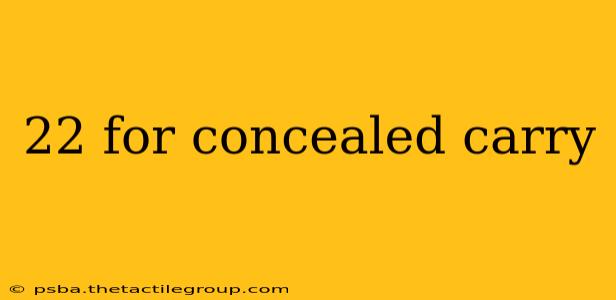Choosing the right firearm for concealed carry is a deeply personal decision, and the .22 caliber often sparks debate. While not the first choice for many, the .22 Long Rifle (.22 LR) does offer some compelling advantages for concealed carry in specific circumstances. This guide explores the pros and cons of using a .22 for concealed carry, helping you make an informed decision based on your individual needs and priorities.
The Case for .22 LR in Concealed Carry
While larger calibers like 9mm and .45 ACP are popular choices, the .22 LR boasts several features that may make it suitable for certain individuals:
-
Lightweight and Small: .22 LR firearms are generally lighter and smaller than other calibers, making them easier to conceal and carry comfortably for extended periods. This is particularly beneficial for individuals with smaller builds or those who prioritize minimal bulk.
-
High Capacity Magazines: Many .22 LR handguns offer high-capacity magazines, providing more rounds per reload. This can be advantageous in self-defense situations where multiple shots may be necessary.
-
Reduced Recoil: The lower recoil of the .22 LR makes it more manageable for new shooters or those with smaller hands, leading to improved accuracy and faster follow-up shots.
-
Affordability: Ammunition and firearms in .22 LR are typically more affordable than other calibers, making it a cost-effective option for practice and training. This allows for more frequent range time, which is crucial for maintaining proficiency.
-
Quiet Options: .22 LR is available in subsonic ammunition, making it a quieter option for training or situations where minimizing noise is important. This is, however, dependent on the firearm used.
The Drawbacks of .22 LR for Concealed Carry
It's crucial to acknowledge the limitations of the .22 LR for self-defense:
-
Stopping Power: The relatively low stopping power of the .22 LR is its most significant drawback. It may not reliably incapacitate a threat, requiring more accurate shot placement and multiple hits to effectively neutralize an attacker.
-
Penetration: .22 LR ammunition may not penetrate clothing or barriers as effectively as larger calibers, potentially reducing its effectiveness in self-defense scenarios.
-
Accuracy at Distance: While accurate at close range, the .22 LR's trajectory can be more affected by wind and distance compared to larger calibers, reducing its accuracy beyond a few yards.
Choosing the Right .22 for Concealed Carry (If Any)
If you are considering a .22 LR for concealed carry, you need to select a firearm that prioritizes reliability and accuracy. Look for well-respected manufacturers known for their quality and performance. Consider the following:
-
Reliability: Choose a firearm with a proven track record of reliability, ensuring it functions flawlessly when needed.
-
Accuracy: Opt for a pistol with inherent accuracy and a trigger that is both smooth and predictable.
-
Concealability: Select a firearm and holster system that allows for comfortable and secure concealment.
-
Maintenance: Understand the maintenance requirements of the firearm and be diligent in keeping it clean and well-maintained.
Alternatives to Consider
If the limitations of .22 LR concern you, explore other concealed carry calibers with proven stopping power like 9mm, .380 ACP, or .45 ACP. These calibers offer a better balance of stopping power, penetration, and manageable recoil.
Conclusion
The decision to carry a .22 LR for concealed carry should be made after careful consideration of your individual needs, capabilities, and local laws. While it offers advantages in size, weight, and cost, its limitations in stopping power must be fully understood. Thorough training, understanding your local laws, and prioritizing responsible gun ownership are paramount regardless of the caliber you choose. This information is for educational purposes only and should not be considered legal advice. Always consult with a qualified firearms instructor and legal professional before making any decisions regarding concealed carry.

